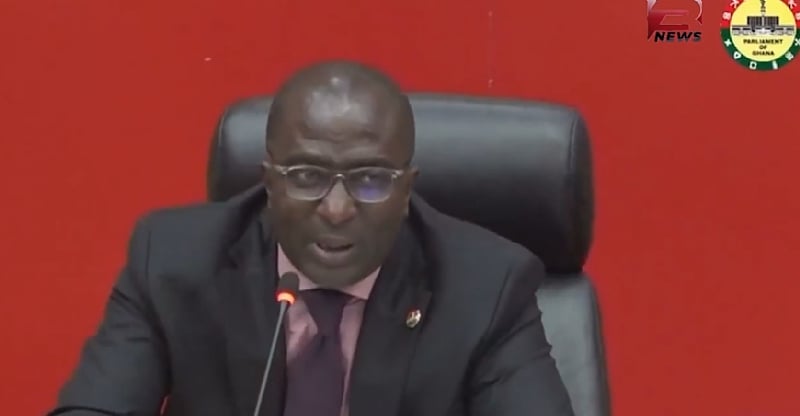The Ghanaian Parliament erupted in laughter on Tuesday during a seemingly serious discussion on the 60th anniversary of Joseph Boakye Danquah’s death, thanks to a single, audacious utterance: “Tweaa.” Minority Leader Alexander Afenyo-Markin was mid-speech when the interjection, a colloquial Ghanaian expression often used to express disapproval or disdain, pierced the air. The Speaker, Andrew Asiamah, momentarily paused the proceedings, a smile playing on his lips, and inquired about the source of the outburst. His query, however, only amplified the mirth, as no Member of Parliament claimed responsibility for the mischievous remark. The Speaker, ever the humorist, encouraged Afenyo-Markin to continue, suggesting the culprit was too intimidated to confess. Afenyo-Markin, seizing the comedic opportunity, playfully attributed the “Tweaa” to the son of Asiedu Nketia, a prominent political figure, further fueling the amusement. This lighthearted episode served as a brief, yet memorable, interlude in the parliamentary session, showcasing the spontaneous and often humorous nature of political discourse.
The seemingly insignificant word “Tweaa” carries significant weight in Ghanaian popular culture, its notoriety stemming from a 2014 incident involving Gabriel Barima, then District Chief Executive (DCE) of Ahafo-Ano South. During a public address, Barima’s speech was punctuated by the now-infamous “Tweaa” from an unseen audience member. His reaction, a mixture of indignation and bewilderment, became an instant viral sensation. Barima’s indignant question, “Who said ‘Tweaa’? Am I your size?”, accompanied by his abrupt exit from the stage, cemented the phrase’s place in Ghanaian collective memory. The incident sparked widespread discussion and debate, generating countless memes and even earning the word its own Wikipedia page. Though Barima was initially dismissed from his position, he was later reinstated, but the legacy of “Tweaa” remained.
The “Tweaa” incident transcended a mere comical outburst; it became a cultural phenomenon, reflecting the dynamic and often unpredictable nature of public discourse. The word itself, seemingly innocuous, became imbued with multiple interpretations, ranging from playful dissent to outright disrespect. Its usage, however, often hinges on context and delivery, making it a subtle yet powerful tool for expressing nuanced sentiments. Barima’s overreaction, while initially met with amusement, also sparked conversations about the appropriate conduct of public officials and the importance of maintaining composure in the face of unexpected interruptions.
The incident’s virality underscored the increasing influence of social media and digital platforms in shaping public perception and amplifying seemingly minor events into national conversations. Barima’s outburst, captured on video and rapidly disseminated across social media, became a shared experience, uniting Ghanaians in laughter and prompting discussions about power dynamics and the public’s right to express dissent. The “Tweaa” incident became a case study in how quickly information can spread in the digital age and how even seemingly trivial occurrences can have far-reaching cultural impact.
The longevity of “Tweaa” in the Ghanaian cultural lexicon is a testament to its adaptability and resonance. The phrase has seamlessly integrated itself into various forms of artistic expression, appearing in movies, songs, and even political discourse. Its usage often serves as a comedic element, referencing the original incident and evoking the collective memory of Barima’s indignant reaction. “Tweaa” has become more than just a word; it’s a cultural symbol, representing a shared experience and a unique moment in Ghanaian history.
The resurgence of “Tweaa” within the hallowed halls of Parliament demonstrates the phrase’s enduring relevance and its ability to transcend social boundaries. The incident, while humorous, also serves as a reminder of the power of language and the unexpected ways in which seemingly trivial expressions can disrupt and enliven even the most formal settings. The MPs’ laughter, the Speaker’s playful response, and Afenyo-Markin’s witty retort all contributed to a moment of levity, showcasing the human element within the often serious world of politics. The incident served as a brief but memorable reminder that even within the confines of Parliament, a touch of humor and a well-placed “Tweaa” can bring a moment of shared laughter and connect people across political divides.














